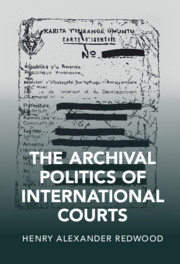Book contents
- The Archival Politics of International Courts
- Cambridge Studies in Law and Society
- The Archival Politics of International Courts
- Copyright page
- Contents
- Acknowledgements
- Abbreviations
- Chapter One The Politics of Archival Knowledge in International Courts
- Chapter Two The International Criminal Tribunal for Rwanda and Its Archive
- Chapter Three The Force of Law
- Chapter Four Contesting the Archive
- Chapter five Reconstituting Justice
- Chapter Six Imagining Community
- Chapter Seven The Residual Mechanism and the Archive
- Conclusion: The ICTR’s Archive
- Bibliography
- Index
- Cambridge Studies in Law and Society
Chapter Three - The Force of Law
Published online by Cambridge University Press: 13 August 2021
- The Archival Politics of International Courts
- Cambridge Studies in Law and Society
- The Archival Politics of International Courts
- Copyright page
- Contents
- Acknowledgements
- Abbreviations
- Chapter One The Politics of Archival Knowledge in International Courts
- Chapter Two The International Criminal Tribunal for Rwanda and Its Archive
- Chapter Three The Force of Law
- Chapter Four Contesting the Archive
- Chapter five Reconstituting Justice
- Chapter Six Imagining Community
- Chapter Seven The Residual Mechanism and the Archive
- Conclusion: The ICTR’s Archive
- Bibliography
- Index
- Cambridge Studies in Law and Society
Summary
This chapter focuses on the archive’s concepts and objects. This first examines how the tribunal’s legal rules shaped the archive, setting out how the court’s statute and ever-evolving jurisprudence created the framework through which the archive’s records were produced. Beginning to get to the political nature of this imagining, the chapter also demonstrates how certain interpretations of the law ended up preventing records from being produced – such as about the international nature of the genocide from entering the archive – and cemented the use of trials as a key governance tool within the international community. The second part zeros in on arguably the two most important objects for the archive: victims and perpetrators. Exploring how these were constituted in particular ways points to how this produced distinctive visions of community and also how this resulted in a number of conflicts between the archives strategies.
Keywords
- Type
- Chapter
- Information
- The Archival Politics of International Courts , pp. 54 - 81Publisher: Cambridge University PressPrint publication year: 2021

